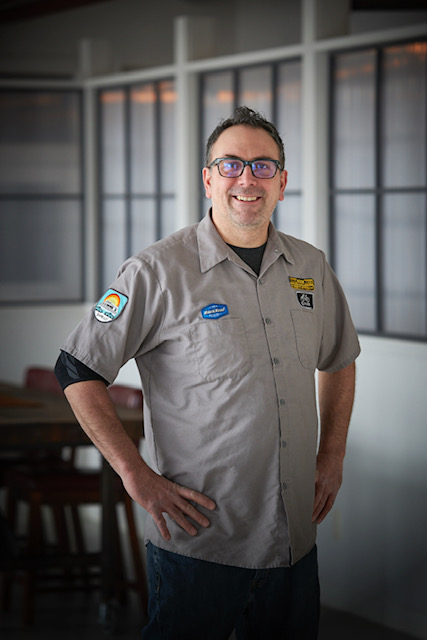A version of this feature ran in the September issue of BRAIN.
BOULDER, Colo. (BRAIN) — For our September magazine edition, we asked our State of Retail panel members: How does your shop manage e-bike battery risk? What steps do you take to manage uncertified batteries, and do you participate in any battery recycling programs?
BOISE, Idaho: Jason Bauer, owner Bauerhaus Bikes

We sell and service only a couple reputable brands of electric bicycles; they use Shimano, Bosch or TQ motors. We categorize bikes with uncertified batteries as "garage fire" bikes and do not sell nor service these. Our e-bike numbers are quite low due to our customer base and lack of availability from the bicycle brands we carry. We do not carry nor service any Class 3 e-bikes that need to stay overnight. Sometimes we will manage triage for flats, shifting and such, but otherwise we refer those repairs to larger shops. Technical issues with the bigger brands are typically straightforward and quick to resolve whereas contacting and/or servicing some of the direct-to-consumer brands can be fruitless. The bikes are seemingly disposable. So far it has not been necessary to participate in a battery recycling program.
WALLA WALLA, Wash.: Kathryn Austin, owner/manager Allegro Cyclery

Consumer demand for e-bikes is clear and profitable. Being a bike shop, we’d really like to see people keep “pedaling” their bikes for the fitness benefits, and we only carry Class 1 e-bikes from our already established brands. We spend a good amount of time educating customers about how to safely use their new e-bike, including safety measures for charging. For the safety of our shop, we make a point to make sure none of our rental e-bikes is being charged overnight. We will not touch or work on the electrical system of “off brand” e-bikes that come into our store, even if it means not fixing a flat if we have to disconnect the motor cable from the back wheel. Not only do we not have the software to troubleshoot those systems if they don’t restart, we cannot take on the liability of working on e-bikes we do not carry. Similarly, we don’t receive or work on uncertified batteries for e-bikes. As for battery recycling, there has not been a need thus far, nor are we aware of a program near us.
MOBILE, Ala.: Brad Burton, owner Cadence120 Bicycles

We had a policy change on Aug. 1 pertaining to electric bicycle batteries. We will continue to do mechanical work on an e-bike, but the battery must be removed by the customer and taken home. We have never had a safety issue, but there have been fires in two stores close to us. One just a few weeks ago, which was the catalyst for our policy change. Another service policy is that we have never worked on electronics except for the brands we sell. Also, all of the e-bikes we sell adhere to the three-class system; we do not sell out-of-class e-bikes. For battery recycling, we participate in the Call2Recycle E-Bike Battery Recycling Program in conjunction with Giant Bicycles.
STAMFORD, Conn.: Julie Gabay, owner, president, buyer Pacific Cycling & Triathlon

We only sell electric bikes from Specialized and Cannondale, two reputable brands that adhere to the three-class system. When servicing these bikes, we keep them inside our shop at all times. If we are servicing any other brand of Class 1, 2, or 3 e-bikes, we require the customer to take the battery with them or pick up the bike the same day. We do not keep any non-branded e-bikes overnight in the shop at any time. We’ve never had an issue with e-bike batteries because we don’t let people leave bikes with batteries as a matter of policy. So far, we have not participated in any electric bicycle battery recycling programs, but we plan to look into it in the future.
MASSILLON, Ohio: Molly Lehman, marketing manager Ernie’s Bike Shop

Battery safety is a real concern for us; although — knock on wood — we haven't had any incidents. For e-bikes with uncertified batteries, we provide the service we can while limiting the amount of time the battery is inside our shop, and we educate the owners about battery safety in their own homes. We find that a lot of folks who buy inexpensive e-bikes online or from discounters haven't been informed of the dangers presented by lithium-ion batteries, especially uncertified ones. Our goal is to provide them with the info they need to stay safe without shaming them for their choices.
We fully service the e-bike systems we sell, and those systems are all UL-certified. E-bikes with those systems are treated just like any other bike brought in for service, and of course, no battery is left plugged in for an extended time or overnight. For bike brands that our shop does not sell, we work on the mechanical elements, but not the electronics and ask the customer to remove the battery before leaving the bike for service. If the battery can’t be removed, we'll arrange an appointment for same-day service so the bike is not left in our shop overnight.
We participate in the Call2Recycle battery recycling program. As retailers, it's important to be responsible stewards of the products we sell, and the recycling program is a piece of that. Since Call2Recycle also provides disposal methods for damaged (and thus more dangerous) batteries, it also gives us some peace of mind for the safety of the shop.
HOPKINS, Minn.: Jonathan Minks, owner Jonny Rock Bikes

We won't let the bikes come in for service if the batteries have not been removed by the owners first. That is a basic best practice that keeps us from having any unattended, off-brand batteries in the shop at any time. We don't carry any out-of-class e-bikes, but have had to decline servicing quite a few models that customers bring to the shop. We can’t find parts or assistance with these off brands to be able to service them effectively. Our message is simple: Shop local and buy local to avoid owning a product that can’t be serviced. We have not found a partner for battery recycling as of yet. We are exploring our options.
BROOKLYN, N.Y.: Ilya Nikhamin and Kasia Nikhamina, co-owners Redbeard Bikes

For a few years, we sold and serviced electric Bromptons and Specialized e-bikes. Since we transitioned to the bike-fit studio model late last year, we no longer stock ready-to-ride bikes. We will continue to sell electric Bromptons by special order if Brompton re-enrolls us in its Click and Collect program, as that bike is an excellent option for New Yorkers living in small or walk-up apartments.
One of our clients just commissioned a Co-Motion Melotius, a tandem with a Bosch Performance pedal-assist motor, integrated with an electronic shifting Rohloff internally geared hub or SRAM AXS components. We're looking forward to building that!
We're aware of battery recycling programs, but we don't have the time or space to participate.
ENCINITAS, Calif.: Will Schellenger, owner El Camino Bike Shop

Electric bicycles with uncertified batteries are not left in our shop. We do quick fixes like flat tire changes on them or turn the repair away entirely. Usually the bikes with questionable batteries are built with questionable components, so trying to fix them is a waste of time anyway. We have been lucky to not have any safety issues so far. If a bike does need to be left and we're not comfortable with the safety of the brand, we ask the customer to take the battery with them. We see a lot of junk e-bikes out there, but carry only big-brand names that make safe, reliable products and adhere to the three-class system. For recycling, we have a local center near us that takes batteries and we also have a customer who collects them to repair other batteries. Thus far, having old batteries laying around has not been an issue for us.
BRADENTON, Fla.: Paul Tobio, owner Ryder Bikes

Any brand we carry for sale must have UL-certified batteries. We will not do business with a brand that does not have its batteries certified. As far as repair, to manage risk of battery leaks or fires, we ask our customers to take their batteries home with them while the bike is in for service, and we do not work on the electrical systems for any e-bike brands that we do not carry. While we are happy to work on the bicycle components — brakes, gears, flats, etc. — of any bike that comes in for service, we will not work on the electrical systems of e-bikes from manufacturers that we don’t stock. The Call2Recycle program is supported by all the brands we sell, so we participate in it for our battery recycling.


